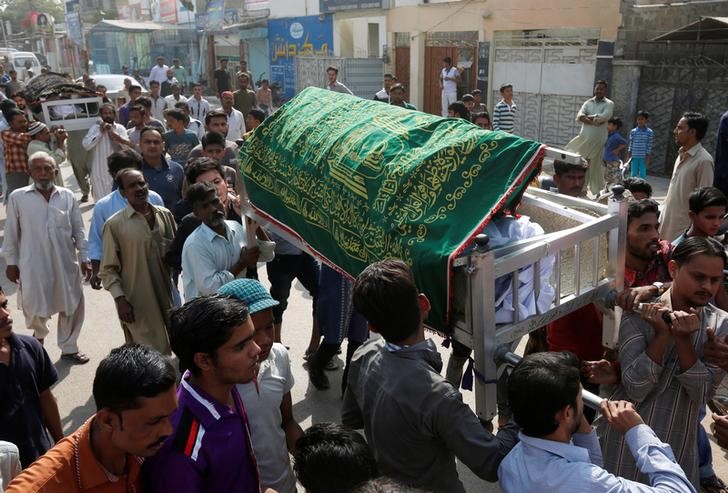Image: Men carry coffins of relatives, who were killed in an explosion at the Shah Noorani shrine in Baluchistan, during a funeral in Karachi, Pakistan, November 13, 2016.
By Asad Hashim and Gul Yousafzai
ISLAMABAD/QUETTA, Pakistan (Reuters) – The second deadly attack in Pakistan claimed by Islamic State’s leadership in a month shows a swift rise of the movement by partnering with local sectarian groups, analysts say, even as an official on Sunday denied IS has a Pakistan presence.
Islamic State’s Arabic-language news service in the Middle East claimed responsibility for the bombing of a Muslim shrine on Saturday, which killed 52 people and wounded scores more in the southwestern Pakistani province of Baluchistan.
The blast at Shah Noorani shrine, in a remote area about 100 km (62 miles) north of the port city of Karachi, happened while hundreds of people were inside. It followed an attack on a police academy on Oct 24 in the same province that was jointly claimed by IS and a Pakistani sectarian faction, Lashkar-e-Jhangvi Al Alami.
The Al Alami faction did not claim direct involvement in the latest attack, but a spokesman repeated that the group cooperates with IS’s leadership and other jihadist movements.
“Right now, in Pakistan, and especially in the cities, wherever there are attacks taking place, Lashkar-e-Jhangvi Al Alami is cooperating with them either directly or indirectly,” spokesman Ali bin Sufyan told Reuters via instant messaging.
The use of local proxies among established militants has been a singular aspect of Islamic State’s entry into Pakistan.
In neighbouring Afghanistan, by contrast, members of the Afghan and Pakistani Taliban have switched allegiances and rebranded themselves as IS fighters.
In Pakistan, however, Islamic State appears happy to let their local allies operate under their own identities in exchange for allowing IS to claim responsibility for high-profile attacks.
“IS may not have a formal structure in Pakistan, but certainly they have support among some of the banned militant groups, particularly Sunni sectarian groups” like Lashkar-e-Jhangvi Al Alami (LeJ-AA), said Zahid Hussain, a Pakistani security analyst.
“It’s a kind of nexus that we are seeing between global jihadi groups and local sectarian groups.”
OFFICIAL DENIAL
Pakistani officials, however, continue to deny Islamic State has developed any meaningful operations in the country, which is home to a host of other Islamist militants including the Taliban, LeJ, Lashkar-e-Taiba and al Qaeda.
“There is no presence of (Islamic State) in Baluchistan. The claim IS made is false,” Baluchistan Home Minister Sarfaraz Bugti told Reuters on Sunday.
Bugti said that recent attacks claimed by IS were carried out by Lashkar-e-Jangvi Al Alami, but the group gave information to IS on the attackers in order to harm Pakistan’s reputation.
“Claims through IS are a conspiracy to isolate Pakistan in the international community,” he said.
He added that he believes the LeJ Al Alami faction was acting on orders of Pakistan’s arch-foe and neighbour, India, though he did not explain how India would facilitate contact with Islamic State. Pakistan officials often say India is connected to militant attacks in Baluchistan.
The Baluchistan attacks came mere months after Pakistan’s chief military spokesman told a press briefing that Islamic State’s plans to expand into the country had been thwarted.
Analyst Hussain, however, said there are now clear signs that Pakistani militants are in direct contact with Islamic State’s central leadership and with the movement’s hundreds of loyalist fighters in eastern Afghanistan.
“Absolutely, there is a connection,” he said. “This is not just a banner as publicity. There is some connection, and contacts.”
ALLIANCES
Amir Rana, another Pakistani security analyst, agreed that Islamic State’s growing influence “cannot be denied”.
“It seems that IS has found an ally in Pakistan, which is probably LeJ Al Alami,” Rana said.
That would help explain why the attacks claimed by IS took place in Baluchistan, he said, because that is where LeJ has some of its strongest operations.
The Islamic State’s Pakistan push also resembles the IS-inspired strikes in the West – hitting soft targets instead of attempting to take territory, as the movement has done in Afghanistan and the Middle East.
That is partly because Pakistan’s relatively strong military makes it more difficult to seize territory.
But the group that branded itself as a new global caliphate of radical Islamist governance, has also turned to a strategy of high-profile attacks used by al-Qaeda since losing territory in Iraq and Syria.
“IS overall has changed. Initially they had territory under their control,” Hussain said. “But now they are on the retreat and are losing territory there (in the Middle East), and now they are turning to the old model of attacks around the world.”
(Writing by Kay Johnson; Editing by Neil Fullick)
Copyright 2015 Thomson Reuters. Click for Restrictions.


